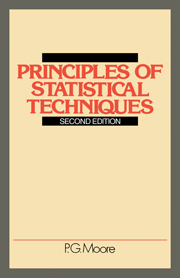 Principles of Statistical Techniques
Principles of Statistical Techniques Book contents
- Frontmatter
- Contents
- Preface
- 1 The Scope of Statistics
- 2 The Collection of Data
- 3 The Tabulation of Data
- 4 The Pictorial Representation of Data
- 5 Frequency Distributions
- 6 Averages
- 7 Measures of Dispersion
- 8 Probability and Sampling
- 9 The Binomial Theorem
- 10 Further Probability Concepts
- 11 Tests of Significance
- 12 Further Tests of Significance
- 13 Sampling Techniques
- 14 Simulation
- 15 Time Series
- 16 Pairs of Characters
- Solutions to Exercises
- Bibliography
- Index
12 - Further Tests of Significance
Published online by Cambridge University Press: 03 February 2010
- Frontmatter
- Contents
- Preface
- 1 The Scope of Statistics
- 2 The Collection of Data
- 3 The Tabulation of Data
- 4 The Pictorial Representation of Data
- 5 Frequency Distributions
- 6 Averages
- 7 Measures of Dispersion
- 8 Probability and Sampling
- 9 The Binomial Theorem
- 10 Further Probability Concepts
- 11 Tests of Significance
- 12 Further Tests of Significance
- 13 Sampling Techniques
- 14 Simulation
- 15 Time Series
- 16 Pairs of Characters
- Solutions to Exercises
- Bibliography
- Index
Summary
The previous chapter was concerned with tests designed to determine, on the basis of a sample, whether the population mean was equal to some specified amount. An alternative test is required when it is desired to investigate whether the variability of the observations in a population has some specified value, on the basis of a sample of n observations from the population. Thus a local corporation might find it more economical to change all its streetlamp bulbs at a fixed time instead of waiting for individual complaints that a lamp has gone out and then sending a man to replace it. If this policy is to be successful, however, the variability of the bulbs must be small, because it would be wasteful to change all the bulbs if only a few were burnt out and many burning hours left in the rest. On the other hand, to delay changing them would result in angry protests from the residents in the streets concerned. Hence the corporation would require bulbs that have little variation about the nominal length of life. A sample of bulbs could be examined from time to time by burning them to extinction in order to see whether the variability was remaining constant.
Suppose that in the past the average length of life of the bulbs has turned out to be 1,608 burning-hourswith a standard deviation of 381 hr.
- Type
- Chapter
- Information
- Principles of Statistical TechniquesA First Course from the Beginnings, for Schools and Universities, with Many Examples and Solutions, pp. 182 - 199Publisher: Cambridge University PressPrint publication year: 1969


